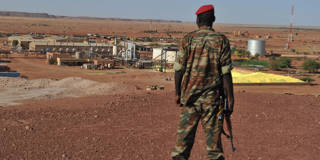The colonial model of resource extraction persists in Africa’s troubled Sahel region. Unless countries like Niger broaden the distributional gains from the exploitation of their natural wealth, democracy on the continent will remain fragile.
CAIRO – Since the ouster of President Mohamed Bazoum in July, Niger, a landlocked West African state, has fallen into dire straits. Perhaps the only good thing to come out of the coup –the latest in a string of military takeovers in the Sahel – is that it has focused international attention on the country, which had previously been relatively stable and democratic.
Renewed interest in Niger’s plight offers an opportunity to reflect on the key development challenges confronting a vast and troubled region. Chief among them is the stickiness of the colonial development model of resource extraction, which has led to intergenerational poverty and environmental degradation – both of which fuel insecurity and migration – in other African countries as well.
Niger embodies Africa’s development paradox. Despite its immense natural-resource wealth, including plentiful renewable and non-renewable energy sources and significant deposits of uranium and gold, it is one of the world’s poorest countries, with more than ten million people (around 42% of the population) living in extreme poverty. Almost half of Niger’s children are not in school, owing largely to mass displacement and school closures caused by an increase in violence. Unsurprisingly, the country is ranked at the very bottom of the United Nations Development Program’s Human Development Index, ahead of only Chad and South Sudan.

CAIRO – Since the ouster of President Mohamed Bazoum in July, Niger, a landlocked West African state, has fallen into dire straits. Perhaps the only good thing to come out of the coup –the latest in a string of military takeovers in the Sahel – is that it has focused international attention on the country, which had previously been relatively stable and democratic.
Renewed interest in Niger’s plight offers an opportunity to reflect on the key development challenges confronting a vast and troubled region. Chief among them is the stickiness of the colonial development model of resource extraction, which has led to intergenerational poverty and environmental degradation – both of which fuel insecurity and migration – in other African countries as well.
Niger embodies Africa’s development paradox. Despite its immense natural-resource wealth, including plentiful renewable and non-renewable energy sources and significant deposits of uranium and gold, it is one of the world’s poorest countries, with more than ten million people (around 42% of the population) living in extreme poverty. Almost half of Niger’s children are not in school, owing largely to mass displacement and school closures caused by an increase in violence. Unsurprisingly, the country is ranked at the very bottom of the United Nations Development Program’s Human Development Index, ahead of only Chad and South Sudan.